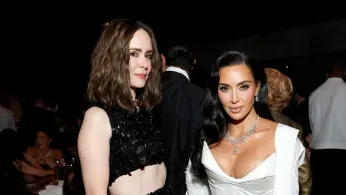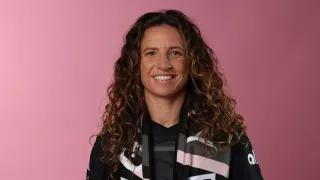
Oct 31
Kim K, Conspiracies, and Queer Curiosity: Why the Moon Landing “Didn’t Happen” Is the Meme We Needed
READ TIME: 3 MIN.
If you woke up this week to a timeline ablaze with lunar memes and Kim Kardashian in a new role as America’s leading conspiracy theorist, you’re not alone. On the October 30 episode of The Kardashians, Kim, 45, dropped a bombshell—at least for anyone who still expects reality TV to stick to reality. Sitting with All’s Fair co-star (and queer icon in her own right) Sarah Paulson, Kim declared, “I don’t think we did . I think it was fake” .
Did you hear that? That’s the sound of 650 million people—who watched Neil Armstrong’s “one small step”—simultaneously sighing, giggling, and reaching for their phones to tweet.
But before we launch into a judgmental orbit, let’s break down why this moment is more than just another Kardashian headline—and why it matters for queer audiences.
Let’s start with the obvious: Kim Kardashian is no stranger to controversy. But her latest foray into lunar skepticism is less about science and more about the stories we believe—and who gets to tell them.
“I’m sending you, like, a million articles, interviews with both Buzz Aldrin and the other one,” Kim told Paulson, referencing astronauts Aldrin and Armstrong with her signature blend of earnestness and pop confusion . “Do it,” Paulson replied, gamely playing along as Kim rattled off her favorite conspiracy hits: the waving flag, the mismatched boot prints, no stars in the photos, and—of course—TikTok as the new arbiter of historical truth .
Queer folks have long been experts at questioning the “official story”—especially when that story has been used to erase or marginalize our histories. Whether it’s rewriting ancient myths with queer heroes or reclaiming “straight” narratives for ourselves, we know a thing or two about finding truth in the margins.
The exchange between Kim and Sarah Paulson (whose own roles in queer cinema and TV—hello, Carol, Ratched, and American Horror Story—have made her a household name in LGBTQ+ circles) is more than just celebrity banter. It’s a reminder that communities thrive when we poke holes in the expected and laugh at the absurd.
As Kim mused about aging astronauts and dodgy recollections—“He’s gotten old and now he slurs on his hand everything, dude. So, I think it didn’t happen” —Paulson’s response was the ultimate wink: “Yes, do it.”
It’s queer camp at its finest: the spectacle, the knowingness, the invitation to question, remix, and reimagine. From drag queens re-enacting historical moments to TikTokers queering classic films, ours is a culture built on remixing received wisdom. Kim’s comments, whether intended as satire or not, fit perfectly into this tradition of playfully challenging the establishment.
There’s a reason conspiracy theories—moon landings, closet keys, Stonewall bricks—hold such fascination. They’re less about facts and more about power: Who gets to decide what’s real? Who gets to be seen, heard, believed?
For many LGBTQ+ folks, the official version of history has often excluded us. We’ve learned to trust our own archives, our gossip, our chosen families. So when Kim Kardashian floats a wild theory on global TV, it’s not just entertainment—it’s a reminder that the mainstream narrative is always up for debate.
Of course, it’s also a reminder to check our sources. NASA, the Smithsonian, and anyone who’s ever watched Hidden Figures can confirm: The moon landing happened, and it was a feat of science, courage, and teamwork . But the beauty of queer culture is that we can hold two truths at once: Yes, celebrate the achievement—and yes, laugh at ourselves (and our celebrities) for wanting to remix the story.
Kim’s moon landing moment is already inspiring memes, TikTok explainers, and even calls for Buzz Aldrin to appear on a Kardashian podcast . The discourse is classic internet: part outrage, part performance, part collective inside joke.
For queer audiences, it’s a reminder that celebrity culture—like the moon—belongs to everyone. We can laugh, critique, and find meaning in even the most improbable places. And in a media landscape that so often marginalizes or commodifies LGBTQ+ voices, seeing two women (one queer, one a pop culture megastar) riff on history is a small, joyous act of reclamation.
So, did the moon landing happen? Absolutely. Should we fact-check before we TikTok? Please. But should we also enjoy the spectacle, the wit, and the chance to rewrite the rules—even for a moment? Always. Because if there’s one thing queer culture has taught the world, it’s this: The story isn’t finished until we’ve all had our say.






